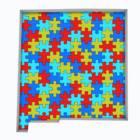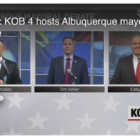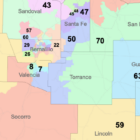2022 Election
Local redistricting efforts highlight tough choices
|
Screen capture of the Albuquerque Citizens Redistricting Committee meeting on April 27, 2022
At a recent Zoom meeting of the Albuquerque Citizens Redistricting Committee, members furrowed their brows and squinted into their computer monitors, examining a newly drafted map that would balance population in each of nine City Council districts.
Member Travis Kellerman, a self-described data-obsessed futurist, had asked the committee’s consultants to find a way to empower voters by dividing the council districts in a way that didn’t pack so many socioeconomically vulnerable residents into two districts in the city’s southern half. The new concept cut the city’s International District in half vertically, combining each piece with wealthier neighborhoods north of I-40. Residents of the condos around Uptown Mall would be in the same district as a large swath of lower-income southeast neighborhoods.
Members asked longtime consultant Brian Sanderoff for some help interpreting what the changes would mean.
“The International District could end up with two members or zero members [representing them on the Council] and that’s a risk that one takes,” he said. “So you need to ask what’s most important, to preserve the communities of interest or to unpack the socioeconomically vulnerable areas.”
That debate demonstrates the tough choices that face residents and politicians this spring. Months after the New Mexico Citizens Redistricting Committee and the state Legislature wrapped up their work redrawing boundaries for legislative and congressional districts, smaller governmental bodies are tackling the tricky and politically charged task, with mixed results.





